Molecular and cellular processes underlying Unverricht-Lundborg disease—prospects for early interventions and a cure
A short overview of the main features of progressive myoclonus epilepsies (PMEs), such as Lafora disease (LD), neuronal ceroid lipofuscinoses (NCLs), and myoclonus epilepsy with ragged-red fibers (M
[...] Read more.
A short overview of the main features of progressive myoclonus epilepsies (PMEs), such as Lafora disease (LD), neuronal ceroid lipofuscinoses (NCLs), and myoclonus epilepsy with ragged-red fibers (MERRF) is given. The stress of this review paper is put on one of the PME’s, the Unverricht-Lundborg disease (ULD)—EPM1, which is caused by mutations in the human cystatin B gene (stefin B is an alternative protein’s name). However, different other genes/proteins were found mutated in patients presenting with EPM1-like symptoms. By understanding their function and pathophysiological roles, further insights into the underlying processes of EPM1 can be obtained. On a broader scale, common pathophysiological mechanisms exist between ULD, LD and NCLs, such as, reactive glia, synaptic remodeling, neuronal hyperexcitability, impairements in the lysosomal/endocytosis system, cytoskeletal functions, and mitochondria. Oxidative stress is also in common. By understanding the underlying molecular and cellular processes, early interventions, better therapies and eventually, by using modern stem cell, gene editing or replacement methods, a cure can be expected.
Eva Žerovnik
View:750
Download:15
Times Cited: 0
A short overview of the main features of progressive myoclonus epilepsies (PMEs), such as Lafora disease (LD), neuronal ceroid lipofuscinoses (NCLs), and myoclonus epilepsy with ragged-red fibers (MERRF) is given. The stress of this review paper is put on one of the PME’s, the Unverricht-Lundborg disease (ULD)—EPM1, which is caused by mutations in the human cystatin B gene (stefin B is an alternative protein’s name). However, different other genes/proteins were found mutated in patients presenting with EPM1-like symptoms. By understanding their function and pathophysiological roles, further insights into the underlying processes of EPM1 can be obtained. On a broader scale, common pathophysiological mechanisms exist between ULD, LD and NCLs, such as, reactive glia, synaptic remodeling, neuronal hyperexcitability, impairements in the lysosomal/endocytosis system, cytoskeletal functions, and mitochondria. Oxidative stress is also in common. By understanding the underlying molecular and cellular processes, early interventions, better therapies and eventually, by using modern stem cell, gene editing or replacement methods, a cure can be expected.
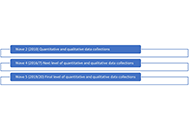 A longitudinal study over 9 years of the role of social support for people with epilepsyOpen AccessOriginal ArticleAim: In people with epilepsy (PWE) relationships and support are critical. From receiving affection to getting help with household and medical activities support can increase Quality of Life (QoL [...] Read more.Christine Walker, Chris L. PetersonPublished: August 29, 2024 Explor Neurosci. 2024;3:352–361
A longitudinal study over 9 years of the role of social support for people with epilepsyOpen AccessOriginal ArticleAim: In people with epilepsy (PWE) relationships and support are critical. From receiving affection to getting help with household and medical activities support can increase Quality of Life (QoL [...] Read more.Christine Walker, Chris L. PetersonPublished: August 29, 2024 Explor Neurosci. 2024;3:352–361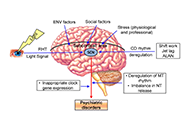 An intricate relationship between circadian rhythm dysfunction and psychiatric diseasesOpen AccessReviewThere is a complex relationship between circadian rhythm dysfunctions and various psychiatric disorders. Circadian (~24 h) rhythms indicate the rhythmic change of different physiological activities [...] Read more.Saptadip Samanta, Debasis BagchiPublished: August 23, 2024 Explor Neurosci. 2024;3:321–351
An intricate relationship between circadian rhythm dysfunction and psychiatric diseasesOpen AccessReviewThere is a complex relationship between circadian rhythm dysfunctions and various psychiatric disorders. Circadian (~24 h) rhythms indicate the rhythmic change of different physiological activities [...] Read more.Saptadip Samanta, Debasis BagchiPublished: August 23, 2024 Explor Neurosci. 2024;3:321–351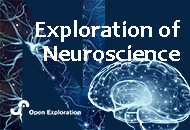 Applying the PRECEDE-PROCEED model to develop MommaConnect: a digital healthcare platform for addressing postpartum depression and improving infant well-beingOpen AccessProtocolThe PRECEDE-PROCEED model is a comprehensive planning and theoretical framework that incorporates epidemiological, environmental, behavioral, and social factors systematically to design, implement, [...] Read more.Bobbie Posmontier ... Tony MaPublished: August 06, 2024 Explor Neurosci. 2024;3:309–320
Applying the PRECEDE-PROCEED model to develop MommaConnect: a digital healthcare platform for addressing postpartum depression and improving infant well-beingOpen AccessProtocolThe PRECEDE-PROCEED model is a comprehensive planning and theoretical framework that incorporates epidemiological, environmental, behavioral, and social factors systematically to design, implement, [...] Read more.Bobbie Posmontier ... Tony MaPublished: August 06, 2024 Explor Neurosci. 2024;3:309–320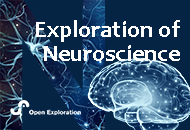 Molecular and cellular processes underlying Unverricht-Lundborg disease—prospects for early interventions and a cureOpen AccessReviewA short overview of the main features of progressive myoclonus epilepsies (PMEs), such as Lafora disease (LD), neuronal ceroid lipofuscinoses (NCLs), and myoclonus epilepsy with ragged-red fibers (M [...] Read more.Eva ŽerovnikPublished: July 18, 2024 Explor Neurosci. 2024;3:295–308
Molecular and cellular processes underlying Unverricht-Lundborg disease—prospects for early interventions and a cureOpen AccessReviewA short overview of the main features of progressive myoclonus epilepsies (PMEs), such as Lafora disease (LD), neuronal ceroid lipofuscinoses (NCLs), and myoclonus epilepsy with ragged-red fibers (M [...] Read more.Eva ŽerovnikPublished: July 18, 2024 Explor Neurosci. 2024;3:295–308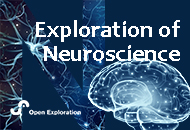 The role of inflammation and oxidative stress in the pathophysiology of depressions: time to consider vitamin C deficiencyOpen AccessPerspectiveDepression is on the rise and medication does not always provide satisfactory relief. This raises the question of a treatment gap that has not yet been (sufficiently) addressed. Inflammation and oxi [...] Read more.Claudia Vollbracht, Marc WernerPublished: July 10, 2024 Explor Neurosci. 2024;3:287–294
The role of inflammation and oxidative stress in the pathophysiology of depressions: time to consider vitamin C deficiencyOpen AccessPerspectiveDepression is on the rise and medication does not always provide satisfactory relief. This raises the question of a treatment gap that has not yet been (sufficiently) addressed. Inflammation and oxi [...] Read more.Claudia Vollbracht, Marc WernerPublished: July 10, 2024 Explor Neurosci. 2024;3:287–294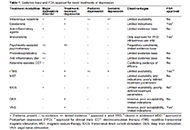 Novel treatments of depression: bridging the gap in current therapeutic approachesOpen AccessReviewDepression poses a significant global health burden, yet current therapeutic approaches focusing on monoaminergic neurotransmission often fall short of achieving full remission and managing acute ep [...] Read more.Amit JagtianiPublished: July 09, 2024 Explor Neurosci. 2024;3:272–286
Novel treatments of depression: bridging the gap in current therapeutic approachesOpen AccessReviewDepression poses a significant global health burden, yet current therapeutic approaches focusing on monoaminergic neurotransmission often fall short of achieving full remission and managing acute ep [...] Read more.Amit JagtianiPublished: July 09, 2024 Explor Neurosci. 2024;3:272–286